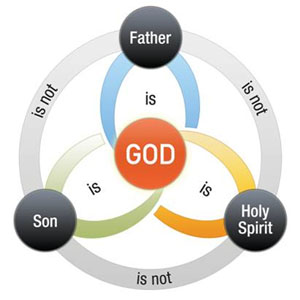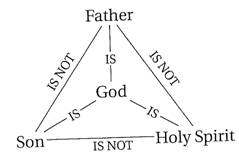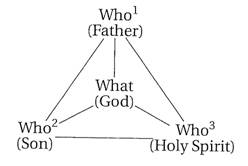|
|

by Justin Taylor
Wayne Grudem’s Systematic Theology [1] defines the Trinity as follows: "God eternally exists as three persons, Father, Son, and Holy Spirit, and each person is fully God, and there is one God" (p. 226).
Broken down, this amounts to three propositions:
God is three persons.
Each person is fully God.
There is one God.
In addition, it’s helpful to elaborate on the fact that when we say “God is three persons,” we mean that he is not just one person, and that the persons of the Trinity are not to be confused. So we can also say:
The Father is God.
The Son is God.
The Holy Spirit is God.
The Father is not the Holy Spirit, and the Holy Spirit is not the Father.
The Holy Spirit is not the Son, and the Son is not the Holy Spirit.
The Son is not the Father, and the Father is not the Son.
If your head is starting to spin—then perhaps this little diagram can help give you a snapshot of what we’ve been saying:

Theologians have typically described God as being of “one essence” but “three
persons.” But what exactly do we mean by “essence” and “person”? In its simplest
terms, essence answers the question,
“What are you?” Person answers the question, “Who are you?”
So when we say that the Trinity entails “one essence” (God) and “three persons” (Father, Son, and Spirit), we are saying that the Trinity has one What and three Who’s. We can draw this as follows:

References:
1 'Systematic Theology: An Introduction to Biblical Doctrine' by Wayne A. Grudem; Zondervan
Trinity Home | Faith Home | History | Inspirational Articles | Essays | Sermons | MW Library - Home
-------
Malankara World
A service of St. Basil's Syriac Orthodox
Church, Ohio
Copyright © 2009-2020 - ICBS Group. All Rights Reserved.
Disclaimer
Website designed, built, and hosted by
International Cyber Business Services, Inc., Hudson, Ohio